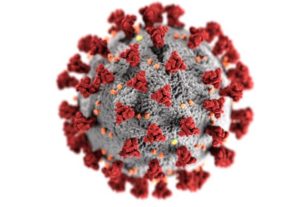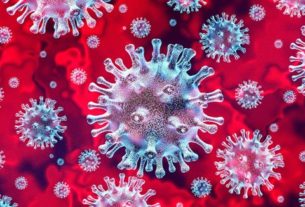From Our Bureau
17TH JULY 2020
The Corona Virus (COVID-19) pandemic situation remained grim globally, with the confirmed cases across the world soaring to 1,36,16,593 and the death toll reaching 5,85,727 in the 216 affected countries and territories, according to the latest update from the World Health Organization (WHO).
Globally, American region continued to be the worst-hit with 71,54,840 confirmed cases and 2,97,855 deaths. Europe came next with 30,08,972 confirmed cases and 2,05,482 deaths. Eastern Mediterranean region reported 13,46,982 confirmed cases and 33,281 deaths.
South-East Asia region’s tally stood at 13,08,441 confirmed cases and 32,100 deaths. African region registered 5,43,122 confirmed cases and 9,130 deaths. Western Pacific region recorded 2,53,495 confirmed cases and 7,866 deaths. WHO Risk Assessment at global level remained very high.
WHO Director-General Dr Tedros Adhanom Ghebreyesus joined the leaders of Spain to pay tribute to those who lost their lives to COVID-19, and stated that “Spain has shown that with political leadership and action, backed by community support, COVID-19 can be controlled, no matter at what stage virus transmission is at in a country.”
The WHO Regional Director for the Western Pacific, Dr Takeshi Kasai, praised New Zealand’s success in controlling COVID-19, adding that it has been a concerted effort to limit and stop COVID-19 on their shores and support other countries in the Region.
The Pan American Health Organization/WHO Regional Office for the Americas and the Coordinator of Indigenous Organizations of the Amazon River Basin (COICA) have agreed to work together to step up the fight against COVID-19 in indigenous areas of the Amazon. PAHO and COICA called for the urgent implementation of responses to the COVID-19 pandemic that are “appropriate to the various geographical and cultural contexts and that include the participation of the communities themselves.”
As of 10th July 2020, as many as 192 countries, territories and areas have implemented additional health measures that significantly interfere with international traffic.
At the media briefing, Dr Tedros said “Yesterday, I had the honour of being in Madrid to join King Felipe VI and Prime Minister Pedro Sánchez, for Spain’s memorial for those who have lost their lives to COVID-19, and for the health workers fighting the pandemic. Earlier in the week I was also honoured to be with President Macron in Paris for the Bastille Day celebrations, which were also a celebration of France’s heroic health workers.”
“Both countries are good examples of the four essential pillars of the response: strong and humble leadership, community engagement, suppressing transmission and saving lives. And both countries are rightly recognizing the incredible contribution of health workers. WHO welcomes the pay rise for French health workers announced on Monday,” he pointed out.
“The pandemic has shown us that there is no health without health workers. I was especially touched in Madrid yesterday by a speech given by a nurse called Aroa Lopez. I want to recall what she said: “We have given it our all. We have worked to the brink of exhaustion. And once again we have understood – maybe better than ever – why we chose this profession: to care for people and to save lives.
“We have been the messengers of the last goodbye to older people who died alone, hearing their children’s voices on the telephone. We have made video calls, we have held their hand and we have had to fight back the tears when someone said, ‘Don’t let me die alone.’”
“Ms Lopez finished her remarks with this appeal: “I want to ask the authorities to defend everyone’s health care. To remember that there is no better tribute to those who are no longer with us than to protect our health and ensure the dignity of our professions.”
“We all owe health workers an enormous debt – not just because they have cared for the sick, but because they have risked their own lives in the line of duty. So far, about 10 percent of all cases globally are among health workers. Many health workers are also suffering physical and psychological exhaustion after months of working in extremely stressful environments.
“To support health workers, WHO has published guidance and training packages on how they can protect themselves. We’re also driving research to better understand the extent of infection among health workers and the risk factors for infection. We’re also shipping millions of items of protective gear around the world and ensuring health facilities are properly equipped.
“Although COVID-19 has rightly captured the world’s attention, we must also remember it is not the only crisis the world is facing. Many countries, especially in Africa and the Middle East, are still reeling from years of conflict and other humanitarian crises. COVID-19 threatens to exacerbate many of these crises. The pandemic, and the restrictions put in place to suppress it, are taking a heavy toll on 220 million people in protracted emergencies.
“While it is too early to assess the full impact of so-called lockdowns and other containment measures, up to 132 million more people may go hungry in 2020, in addition to the 690 million who went hungry last year. Deep budget cuts to education and rising poverty caused by the pandemic could force at least 9.7 million children out of school forever by the end of this year, with millions more falling behind in learning.
“The economic impact of the pandemic in humanitarian settings can aggravate already dire living conditions – more displacement, food shortages, risk of malnutrition, decrease in access to essential services, mental health problems, and so on. WHO is working through our 150 country offices to support the response to COVID-19, to support the continuity of essential health services, and to engage communities to ensure demand for these services is maintained.
“It’s also vital that as an international community, we use this opportunity not only to respond to the pandemic, but to build health systems that are more resilient, and more able to withstand the impact of health emergencies. The pandemic is teaching us that health is not a luxury item; it’s the foundation of social, economic and political stability.
“Three months ago, WHO launched its updated Strategic Preparedness and Response Plan, which estimates the resources needed to support WHO’s work on the pandemic. But we all know that the impacts of the pandemic go far beyond health, and so do the needs, especially for the poorest and most vulnerable countries. That’s why the UN launched the Global Humanitarian Response Plan for COVID-19 in March.
“Today I’m honoured to welcome Mark Lowcock, my friend, the United Nations Under Secretary-General for Humanitarian Affairs and Emergency Relief Coordinator, to present the Global Humanitarian Response Plan update. The Global Humanitarian Response Plan addresses the immediate humanitarian needs caused or exacerbated by COVID-19 in 63 priority countries with existing humanitarian crises. If we fail to address the wider impacts of the pandemic, we risk an even greater crisis than the one brought about by the virus itself.
“One of the other speakers at yesterday’s memorial was Fernando Hernandez Calleja, who lost his brother to COVID-19. I want to finish by quoting him. This is what he said: “More than kindness, more than love, compassion is the emotion that most makes us human. Compassion allows us to understand the pain of others, their thwarted aspirations, their sadness. That is why I am asking, today, for your compassion.”
“I want to echo Fernando’s call to the whole world. More than anything, we are asking for your compassion. This pandemic can only be defeated when we unite, and through compassion,” the WHO Director-General observed. (eom)



